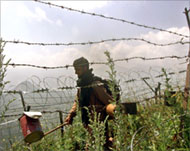Israeli travel alert worries Kashmiris
Tourism officials and operators alike are disappointed at reports that Israel has cautioned its citizens against visiting Indian-administered Kashmir for fear of attacks by Islamic rebels.

A report from Jerusalem on Wednesday said that Israel has instructed its citizens to leave Kashmir immediately.
“It is unfortunate,” said houseboat owner Gulam Hassan Shalla, who recently hosted a five-member group of Israeli tourists on the picturesque Dal Lake in Srinagar.
Tourism officials in the state’s summer capital put the blame for the Israeli Government directive on “undue publicity” in both the print and electronic media about the growing number of Israeli visitors to the predominantly Muslim Kashmir Valley.
In a statement, Israel’s Foreign Ministry ordered all Israelis currently in Kashmir to leave as soon as possible and to avoid visiting the region.
“The advisory has been issued at the recommendation of the anti-terror headquarters attached to the Prime Minister’s Office,” Foreign Ministry spokesman David Saranga said.
 |
|
Violence had kept tourists away |
Israeli officials expressed concern that “terror organisations active in Kashmir have spotted the presence of Israelis and could be planning an attack”.
Several separatist and pan-Islamic groups are fighting against Indian rule over the disputed territory that has been a strategic bone of contention between India and Pakistan.
The 16-year-old conflict has claimed more than 40,000 lives, so far, although local human-rights groups insist the death toll is twice as high.
Undue publicity
Kashmir’s official statistics indicate that Israelis account for 10% of the total 12,000 foreign arrivals in Kashmir so far this year.
The trend could prove “counterproductive”, a senior Kashmir police official warned publicly earlier this week.
Elaborating his point, the police officer said that in view of the anger among local Muslims against Israel’s continuing military crackdown on Palestinians, the presence of Israeli nationals would not be viewed favourably in Kashmir.
|
“Why do [journalists] not report about tourists from Malaysia, Kuwait, UAE and Singapore coming to the valley in large numbers?” Kashmir tourist official |
Since then, tourism officials and tourism-industry personnel have accused journalists of “overplaying” the story.
“Why do they not report about tourists from Malaysia, Kuwait, UAE and Singapore coming to the valley in large numbers?” one official complained.
He said Israelis had been visiting Kashmir even before the armed separatist uprising began in 1989, which according to him proves that it is hardly a new phenomenon.
At the peak of the political unrest, very few Indian tourists were visiting the state, to say nothing about foreigners.
Turnaround
The impact of the slump in visitors was felt keenly by the local economy given that tourists’ spending constituted one of the main sources of income in the Valley and provided livelihood to thousands of families connected with the industry.
It is only recently that many houseboats on the twin Dal and Nagin Lakes of Srinagar have taken to using Hebrew on signboards and menus in response to a steady increase in Israeli visitors to Kashmir.
 |
|
The Israeli Government has told |
In general, hoteliers and tour operators are happy that citizens of the US, UK, Germany, Spain and France besides the Gulf states, Israel, China, Singapore and other Southeast Asian countries are defying the travel-advisory warnings issued by their governments from time to time, to come to Kashmir and inevitably get bewitched by its natural beauty.
According to Gulam Qadir Guru, a houseboat owner, the main attraction for Israeli tourists are the graves that local lore says are of Jesus Christ and Moses – located in downtown Srinagar and near Bandipore town in north Kashmir.
Guru said Israeli tourists show keen interest in historical monuments such as Srinagar’s splendid Grand Mosque, the majestic Hazratbal shrine and Takht-e-Suleman (Throne of Solomon) atop the Shankaracharya hill overlooking Dal Lake.
There is also a belief among a section of the local population, backed by some scholars, that Kashmiris are a “lost tribe” of Israelis.
They refer to umpteen number of words with similar meanings in the Kashmiri and Hebrew languages.
Cautionary tale
But houseboat owner Shalla say all these things are secondary. “For us, a tourist is a tourist whether from the US, Gulf or Israel,” he said.
|
“For us, a tourist is a tourist whether from the US, Gulf or Israel” Gulam Hassan Shalla, Dal Lake houseboat owner |
“We receive thousands of visitors from across India every year even though there is a lot of public resentment against the country.”
None the less, an incident occurred way back in 1992 that serves as a grim reminder of the possible threat to Israeli nationals from Islamic fighters active in the state.
A number of Israeli tourists staying in a houseboat on the Dal Lake were taken captive by an armed separatist group. While they were being removed to another place, a scuffle broke out between the two sides, resulting in the deaths of one of the Israelis and a captor.
A second Israeli who managed to get away was found hiding in an island on the lake by activists of the separatist Jammu Kashmir Liberation Front, who rescued him and handed him over to the local office of the United Nations Military Observers Group (for India and Pakistan).